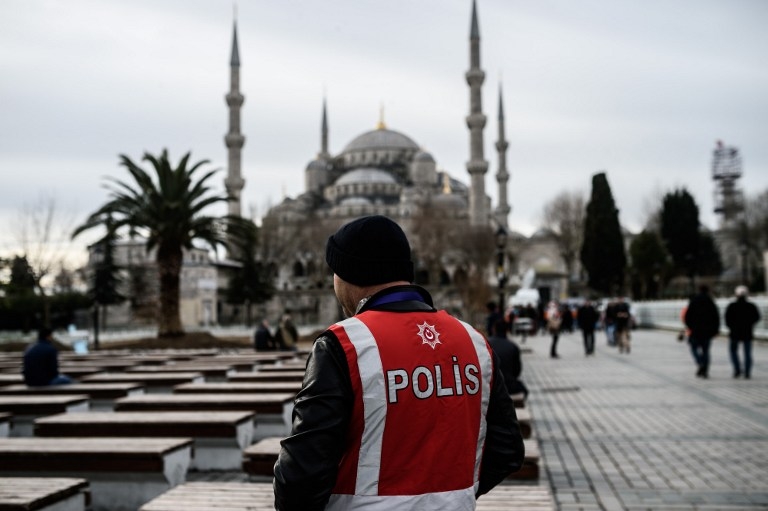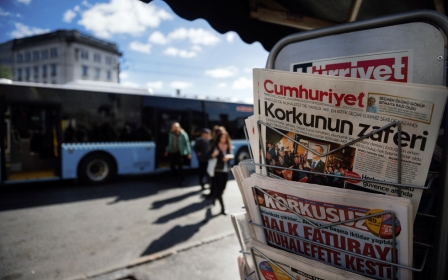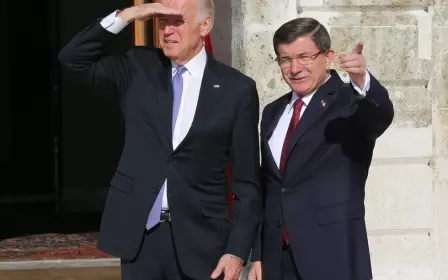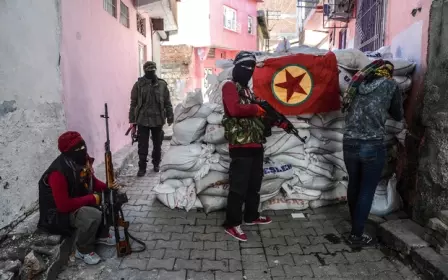
Turkey's unnoticed war against the Islamic State
Two weeks ago, Turkey hit 500 Islamic State targets in Syria and Iraq, and killed 200 militants in these cross-border operations and at the same time it continued to arrest dozens of suspected IS members in the country. However, these very recent anti-IS moves – which came after the militant group carried out a deadly suicide bombing attack in Istanbul – did not find much attention in the international media and Turkey’s critics continued to brag their accusations that it supports IS.
Unlike the US, France or even Lebanon, Turkey was also left alone as limited number of countries expressed their solidarity or sympathy with Ankara after being the target of terrorism. Even when some analysts link terror attacks in the West as part of a "blowback" effect of its foreign policy, the overriding notion remains of disgust with the terrorists, not gloating at the victims – especially in the immediate aftermath of such occasions.
The anti-Turkey allegations are not new. For example in 2014, The New York Times claimed that Turkey allowed IS fighters and weapons to flow across its borders. In 2015, CNBC's David L.Philips wrote an article entitled, "Why is Turkey supporting Islamic State fighters in Iraq?" The Business Insider came up with the title: “Senior Western official: Links between Turkey and ISIS are now ‘undeniable’.” Most recently, both Russian and Israeli officials have joined the club of accusations. No one cared about real evidence.
Turkey was among the very first countries to list IS as a terrorist organisation and the militant group carried out 10 terrorist attacks in the country, one of which marked the deadliest terrorist attack of Turkish history. The allegations of Turkey-IS links were at a peak even when its diplomats were taken hostage by the militant group in Iraq’s Mosul.
Turkey’s critics ignored the fact that the country recognised the group as terrorist and they have also put the lives of Turkish citizens in danger with their continuous calls for Turkish government to be harsher on IS. Bordering troubled neighbours and having 49 of its citizens being held by one of the most barbaric organisations of all times was a sensitive issue to deal with.
After successfully getting its citizens freed through its links with certain Iraqi tribes which had influence with IS, Turkey started taking tougher position against the militant group and joined the US-led coalition. Ankara later started letting the US use its Incirlik Air Base to hit IS targets and recently Germany also started to use the strategic air base.
Turkey also allowed Iraqi Kurdish Peshmerga forces to pass through its soil to cross into Syria’s Kobani to remove IS from the Kurdish-populated town. This also showed that Turkey has no problems with Kurds in general but with militants of the Kurdistan Worker's Party (PKK) and its affiliates in Syria, which are accused of ethnic cleansing against Arab and Turkmen populations.
IS ups the ante against Turkey
The terrorist organisation has carried out attacks in Turkey in the past but the Istanbul bombing was the first instance of a popular touristic destination being targeted. IS is also blamed for a suicide bombing in Suruç, a border town in south Turkey, and twin suicide bombings which hit Ankara in July and October last year, respectively. The first attack, targeting a rally of activists, killed 32 people while the second one occurred near a train station at yet another rally of activists, killing 102 people.
Statistically speaking, Turkey has detained more than 3,300 people since IS emerged in Syria, arresting 847 total militants, according to figures from the Interior Ministry. A large number of IS suspects are foreigners and Turkey has banned more than 35,000 people from 124 countries suspected of trying to enter the country to travel to Syria and join the militant group. Turkish officials have also deported 2,894 others from 92 countries for allegedly having connections with the terrorist group, according to official figures.
Turkey attacked by both ISIS and PKK
The bombing attack at the Diyarbakır rally of the pro-Kurdish People’s Democratic Party (HDP) just two days before the 7 June elections had a serious impact on voters. A survey conducted by IPSOS for CNNTurk revealed that the Diyarbakır bombings made significant shift of votes to the HDP, helping it to pass 10 percent threshold. When Turkish politics entered into a deadlock after the elections in which ruling AK Party failed to form a single party government, IS carried out a suicide bombing attack in Suruç. Days after that attack, the PKK announced on 11 July that it ended the ceasefire and killed two policemen while they were asleep in their flat.
While both organisations were expecting Turkish government to sacrifice its policies and soften towards them, Ankara did the opposite and started simultaneous air strikes against the PKK in Iraq and IS in Syria. At the same time, hundreds of suspects from both organisations were taken into custody.
Later on 10 October, IS carried out twin suicide bombings in Ankara, the deadliest attack in modern Turkish history, only three weeks before the snap elections. However, accusing the Turkish state of killing dozens of its citizens and PKK’s decision to end the ceasefire, this time backfired and the public gave a massive electoral victory to the AK Party. The timing of the Ankara was not only related to the election but also Turkey’s air strikes on IS targets in Syria and preparing to form a safe-zone (also described as IS-YPG free-zone) in northern Syria.
Turkey was also criticised for not focusing its anti-terror efforts on IS alone as Ankara launched a military campaign against PKK militants. But why would critics expect Turkey to differentiate between terrorists? Why should Turkey forget about the decades-old terrorism from the PKK and respond only to the newly-surfaced IS terror? Why not fight both?
The 12 January suicide attack in Istanbul also came two days after the Turkish Armed Forces (TSK) targeted IS positions in northern Syria with howitzers and tanks along with anti-IS coalition aircraft. Several villages were seized by opposition groups after the Turkish offensive and the bombing attack in Istanbul did not stop Turkey from continuing its military assistance to the opposition groups in the field.
The unity and solidarity that the world powers and international media showed during the attacks in Paris or even Beirut up to a certain degree was not shown for Turkey. These double standards in sharing the pain do have a meaning for both Turkish government and the public, which suffered from Marxist terrorism for decades and now also an extremist militant group.
However, the lack of sensitivity in covering the Ankara or Istanbul attacks was not limited to international media but to anti-government circles at home too. The controversial Cumhuriyet daily, which came with a headline of "France cries for its children" after the Paris terrorist attacks, far from adopting a sensitive stance came with the headline of "Country of massacre", drawing criticism from the majority of the society and being praised by those who accuse Turkey of supporting IS.
Is Turkey buying Russian oil?
Since the IS took control of some Syrian towns that border Turkey, there have been attempts at smuggling oil into Turkey, but 21 million gallons of smuggled oil were confiscated in separate incidents by border guards. In some cases, Turkish soldiers were getting killed by smugglers, some of whom are believed to be IS members.
Contrary to the harsh criticism of Turkey for alleged insufficient efforts in taking the necessary measures, the Turkish state has spent TL 300 million ($102.77 million) to improve conditions on the Syrian border and provide precautions.
In recent months, Turkey faced accusations of buying IS oil, yet there was again no single piece of evidence – other than media reports citing unnamed officials or witnesses – to back these claims. Once Turkish army downed a Russian jet that violated its airspace, once close trade partner Moscow joined the anti-Turkey campaign and released some satellite images, in which it claimed to prove Turkey buying oil from IS.
The oil tanks seen on the Russian satellite images were showing the oil exported by the Iraqi Kurdish administration to a base of Turpas, Turkey's largest industrial enterprise with four oil refineries. Tupras, which is owned by Turkey's largest conglomerate, Koc Holding – which is known for its anti-government stance – strongly refuted the accusations. Iraqi Kurds also slammed the Russian accusations and said it is impossible for IS to pass through its territory and pass into Turkey. Turkish PM Ahmet Davutoglu said Russian accusations are reminiscent of "lies" produced by the "Cold War-era Soviet propaganda machine."
ISIS brands Erdogan as the Satan
IS released a video in August of last year, calling Turkish people to "conquer Istanbul and Turkey from the ones who cooperate with the West," while referring to President Erdogan as "Satan" who allegedly sold the country to the US and Western powers and harshly criticised him for supporting the US-led coalition against IS.
Later in September, the English-language online magazine of IS, Dabiq, issued its 11th edition, with Erdogan speaking to Obama on the cover. In the magazine's cover article, "The crusader coalition involved in the war against the Islamic State" is heavily attacked, implying the coalition conducts the fight against the militant organisation.
Also in the same month, a pro-IS social media account issued a death warrant for Turkish President Erdogan. Declared as an "apostate" for supporting and collaborating with the US-led counter-terror coalition after Turkish jets targeted IS positions in Syria and northern Iraq. Erdogan was sentenced to death in the so-called fatwa published on the social media account.
On the other hand, Erdogan gave dozens of speeches condemning the ideology and actions of IS and calling on all allies to fight against the organisation. "Throughout history, only a small number of its [Islam's] enemies managed to damage Islam as much as organisations like Daesh, Boko Haram, al-Shabab and al-Qaida have," he said in one of his recent statements.
Despite being the biggest victim of IS terrorism (after Syria and Iraq) and despite being one of the leading countries that gave the biggest blow to the militant group, Turkey still finds itself around such accusations. Though there had not been any evidence to prove these claims so far, certain media will want to make you believe their propaganda with their reports, citing anonymous – probably non-existant – sources.
One may not like Erdogan's policies, ideology or even his character, but there should be some logic taken into account when bringing up such foolish claims.
-Mehmet Solmaz is a Turkish-British journalist who covers news developments in Turkey and the region for the Daily Sabah newspaper. He also frequently appears in international media to comment on Turkish politics and diplomacy.
The views expressed in this article belong to the author and do not necessarily reflect the editorial policy of Middle East Eye.
Photo: A Turkish police officers stands guard on 15 January, 2016 near a makeshift memorial in tribute to the victims of January 12 deadly attack at the Istanbul's tourist hub of Sultanahmet in Istanbul (AFP).
Middle East Eye propose une couverture et une analyse indépendantes et incomparables du Moyen-Orient, de l’Afrique du Nord et d’autres régions du monde. Pour en savoir plus sur la reprise de ce contenu et les frais qui s’appliquent, veuillez remplir ce formulaire [en anglais]. Pour en savoir plus sur MEE, cliquez ici [en anglais].




